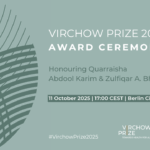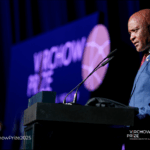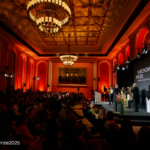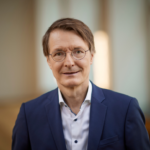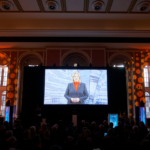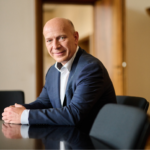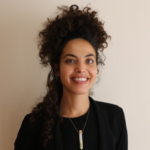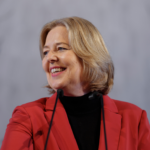World Brain Day is observed annually on July 22 to raise awareness about brain health and neurological disorders. This emphasis on prevention includes early detection, effective management, and raising global awareness to mitigate the impact of these conditions.
This year, the focus of World Brain Day will be on “Brain Health and Prevention.” Read more on the history of the establishment of World Brain Day here.
The Virchow Foundation is delighted to collaborate with SameYou, a Charity Foundation co-founded by actor Emilia Clarke MBE to further advocate for change and raise awareness about brain health, neurological disorders and their consequences. Both SameYou and the Virchow Foundation are committed to advancing “health for all” together.
SameYou co-founder and CEO Jenny Clarke MBE, mom of Emilia Clarke, answered some in-depth questions about mental health, brain injury recovery, her daughter’s survival of a brain trauma and the significant impact she has on many people by openly speaking about it. SameYou also provides a powerful platform and encourages survivors, carers or nurses to share their story and let their voices be heard.
Read the full interview below.
Please introduce SameYou’s mission and how it addresses brain injury and mental health.
SameYou is a brain injury recovery charity that works to develop pioneering mental health recovery treatment for survivors, advocates for improvements in rehabilitation provision and raises awareness. A digital charity, SameYou works with leading academics and rehabilitation services to find new ways of augmenting the workforce and providing education and training for clinicians and the public. It also provides return to work solutions for survivors and their loved ones. My daughter, actor Emilia Clarke MBE, survived the first of two life-threatening brain haemorrhages while working on the Game of Thrones television series. She told her story in 2019 to launch the charity and highlight the lack of rehabilitation preventing people to live productive and fulfilling lives after brain trauma. Her story led to around 10,000 young survivors reaching out to us with their own stark messages, each revealing a huge unmet need for rehabilitation worldwide, leading to significant mental health issues.
In what ways do you believe mental health intersects with broader global health concerns?
Skilled surgeons can often perform miracles to save lives. But once you’re out of intensive care, it’s only then that you become aware of the critical need for quality rehabilitation and mental health recovery for the long journey back to wellness, confidence and health – that essential support to be the ‘same you’ as you were before. But shockingly, it isn’t always available. 1 in 3 people will experience a brain injury at some point in their lives*, whether a stroke, a bleed on the brain or a traumatic accident. Despite the scale of the problem, health and social care services struggle to meet the demand, resulting in personal distress and causing a preventable increase to the burden of GPs and A&E services. The stories we receive reveal a global problem. Many don’t have access to the quality or length of rehabilitation they need. Many are ashamed of their brain injury because of societal stigma. Whatever the cause, survivors suffer mental health issues similar to post-traumatic stress disorder as well as anxiety, depression and fatigue. The charity’s goal is to help survivors around the world get the right treatment, to benefit from immediate neurorehabilitation after leaving hospital, and to do everything possible for them to be the same person post-injury as they were before.
The Virchow Prize, awarded by the Virchow Foundation, was initiated to give a face to global health champions and raise awareness and engagement for the field overall. Do you believe individual stories of brain injury survivors contribute to raising awareness on this topic?
The thousands of people who contacted us after Emilia spoke inspired us to fight to close that gap accessing rehabilitation for all survivors. What we are here to do is call for equity of access to recovery services. One voice can’t make a difference but if we come together and amplify the voices of all survivors, we can enable policy makers to understand that this is both a human and economic imperative. Each week, we publish survivors’ stories, called Portraits, on our channels, each detailing their journeys to not only raise awareness, but to give others hope. Survivors have told us it makes them feel empowered and able to take back control to put their own experiences into words. By listening to the survivors, SameYou has also produced the Untold Story of Brain Injury animation, which tells the stories of brain injury survivors from the survivors themselves, with some speaking out for the very first time. Stories were also featured in the Untold Story of Brain Injury report which compiled 1,400 lived experience stories sent to SameYou, highlighting the scale of the unmet need, which was edited by a leading clinical neuropsychologist. Both were presented at an in-person and live streamed event with a panel of clinicians, the NHS and survivors to put the urgent need into sharp focus.
Can you share an example of how hearing personal stories from survivors has positively impacted SameYou’s approach to mental health advocacy?
As outlined above, survivors have shaped the charity from the very start and they are our focus to this day. Survivors tell us they feel they are ‘falling off a cliff into the unknown’ when they are discharged from acute care. When you’re young, your life is about to start, you don’t really know who you are. If you have a brain injury which makes you question your brain and your mental abilities, and you have depression and anxiety on top it’s tremendously difficult. We need much more understanding and empathy and support. Brain injury doesn’t just happen to the brain; it happens to the whole person.
What partnerships or collaborations does SameYou engage in to enhance its impact on global mental health?
SameYou works with partners around the world to create innovations to tackle mental health and promote wellbeing: SameYou is a founder member of the World Health Organization’s World Rehabilitation Alliance, committed to boosting worldwide access to rehabilitation. Our latest collaboration is with the Big Issue to tackle the turmoil of returning to work after brain injury. We have launched a new partnership to provide job coaches to help support survivors and their loved ones. One of the biggest innovations we have funded is a partnership with the RCN Foundation and Nursing Studies at the University of Edinburgh, developing a postgraduate certificate programme for registered nurses with clinical experience and interest in neurological care. It focuses on a holistic approach to rehab care for survivors. Our work also includes a partnership with the Royal College of Nursing Foundation and the University of Edinburgh to explore and analyse the diverse experiences and unmet needs of young adults recovering from an ABI or stroke. SameYou is also funding a ground-breaking three-year study into the biopsychosocial impact of brain injury with Spaulding Rehabilitation, a world-leader in advanced rehabilitation treatment and research and the official teaching hospital for Harvard Medical School’s Department of Physical Medicine and Rehabilitation.
SameYou worked with University College London during the Covid pandemic, when people with stroke and other brain injuries were spending less time in hospital receiving neurorehabilitation, to set up a pioneering group rehabilitation programme called Neurorehabilitation Online (NROL). Scores of patients have gone through this one-to-many programme so far which has revealed life-changing results. It is operated in real time via Teams, delivered in London and across 5 Hospital Trusts in Lancashire – which has just been commissioned by the NHS.
Alongside this, our biggest advocacy initiative to date is working with Mount Sinai New York to provide SameYou Recovery Sofas. These will be placed in healthcare locations where newly trained volunteers can meet brain injury survivors and their families to help unlock the issues they are facing. We also firmly believe in giving people the tools – and the power – to help with their own recovery. We have created a digital resource library of 50 videos called Recovery@Home with clinicians and therapists to provide reassurance on survivors’ journey to recovery, which includes advice around relationships, getting back to work, nutrition, sleep and cognitive changes after brain injury. And we have launched phase 1 of our peer support programme, SameChat, alongside Sphere Rehabilitation which connects survivors and their carers to others with lived experience of brain trauma.
What strategies does SameYou employ to combat stigma surrounding mental health in various cultural contexts?
There is so much stigma around brain injury and mental health. But we see that people are communicating and telling their stories because they say that Emilia has normalised it. They say that hearing someone talk about the challenges of brain injury so publicly enabled and emboldened them to tell their story – some for the first time. It was as if people suddenly had permission to speak out. In the 5 years since we launched, we have developed communications strategies aimed at providing information, education and developing an increased sense of empathy and awareness for brain injury survivors within their communities and within civil society throughout the world.
How about addressing the mental health needs of marginalized or underserved populations?
We work as part of the WHO’s World Rehabilitation Alliance and I am a member of the WHO’s External Relations workstream as well as being an advisory board member for Cochrane research to help influence major change in the way stroke and brain injury rehabilitation is serviced around the world. My role is to lead the charity’s transformational agenda to deliver radical change in pathways of care for brain injury survivors, and to help launch a movement to shift attitudes on brain injury and raise awareness of the inequality survivors face. We see the therapeutic provision in the largest industrial countries does not meet the huge need, while in middle-and lower-income countries, rehab after brain trauma is seldom provided for. Our database of 50,000 supporters is diverse with people around the world communicating to us via our website and social media channels.
Both SameYou and the Virchow Foundation are working to advance the Sustainable Development Goals, most directly SDG 3 – Good Health and Well-Being where SDG 3.4 specifically addresses the need for mental health promotion. In your opinion, what are some of the most pressing issues that prevent Acquired Brain Injury and mental health support from reaching the levels needed?
One of our founding principles is that we believe nurses are the key to the future of successful rehabilitation. But our own research in the US and the UK has shown that nurses are not enabled to play as big a part as they could in helping patients come to terms with their lives after surviving trauma. We found it hard to understand why most of the multidisciplinary teams we met and worked with didn’t include nurses. We know from our own experience and that of patients around the world the true value of care to aid recovery, and how damaging it is for patients if that support is missing. It led to our partnership with the RCN Foundation and Nursing Studies at the University of Edinburgh to develop a postgraduate certificate programme for registered nurses, focusing on a holistic approach to rehab care including mental and physical recovery. Unfortunately, the lack of recovery care is an issue that affects every corner of the planet. It paved the way to us working with Nursing Now for its Global Solutions Initiative, to connect with early-career nurses around the world to share ideas for innovation and make a difference in the recovery pathway. This included mentoring nurses in Ghana and evaluating how technology can play a role in rural communities.
What can we as the global community do to help minimize this gap?
Tackling the issue of a limited workforce and instead working as a community to build an elastic workforce. It is clear it will need a joined-up approach to help patients around the world, to listen to them, to help them access what they need to enable them to live well. With nurses’ experience and empathy, it will help to pinpoint the needs and amplify the patient’s voice. It wasn’t until we, as a family, had to confront our own life-changing situation that we could see and understand the problem. To this day, we are so thankful that with the unstinting support of Emilia’s nurse it helped her to make a full recovery. We are proud that Emilia is an Ambassador of the Royal College of Nursing, which raises the profile of nursing, and is an Ambassador of Nursing Now, to highlight neuro nursing worldwide.
For further information, see SameYou.org
Sources
*UCL/UCLA
**Source: SSNAP – strokeaudit.org
Media contacts
Steffi Gasteiger (she/her), Communication & Partnerships Manager, Virchow Foundation, press@virchow.foundation
Victoria Birch (she/her), Communications Manager, SameYou victoriabirch@sameyou.org


